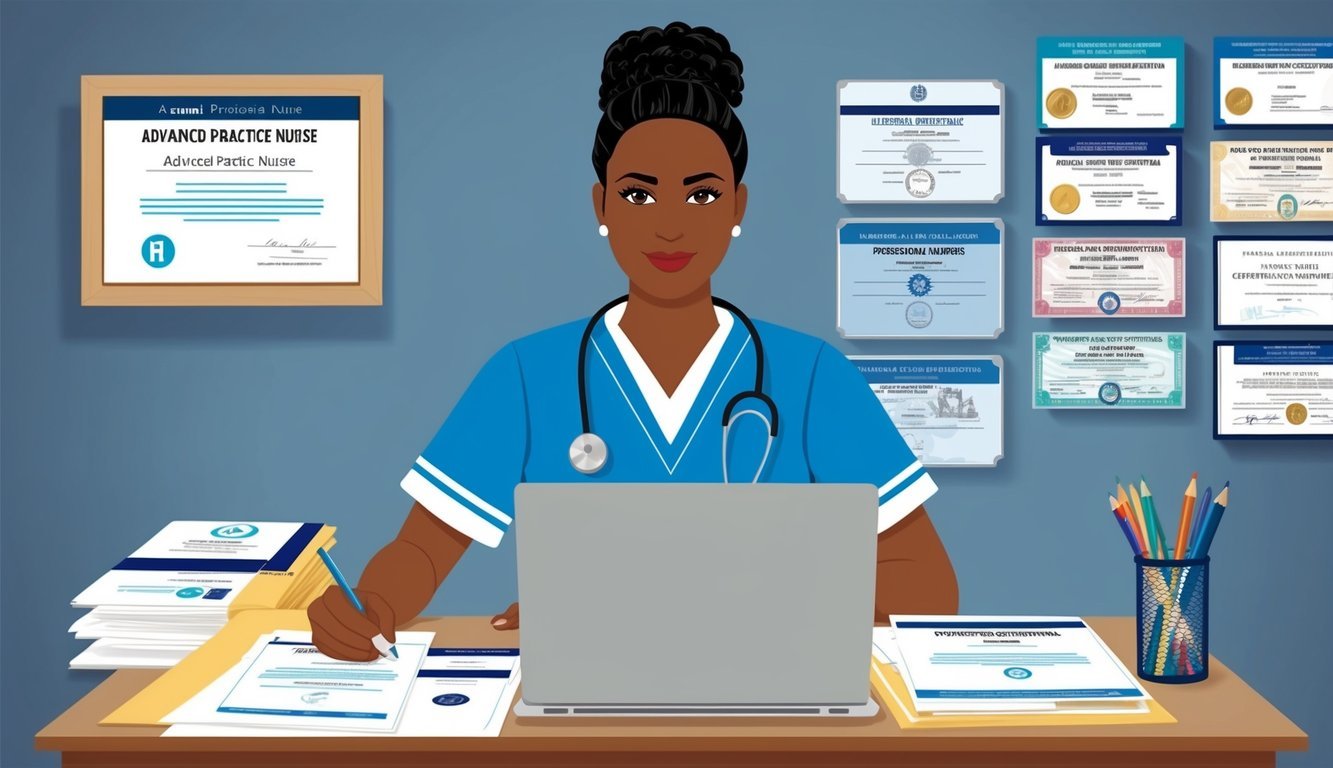The Master of Science in Nursing (MSN) is an advanced degree that can elevate your career in the nursing field.
Pursuing an MSN allows you to specialize in areas such as management, education, or advanced clinical practice.
With an MSN, you can equip yourself with the skills needed for higher-level positions.
This degree not only enhances your clinical abilities but also opens doors to various career pathways that can significantly increase your earning potential.
With multiple types of MSN programs available, you can find a path that suits your current skills and goals.
Whether you choose to study online or on-campus, earning your MSN can prepare you for roles like Nurse Practitioner or Nurse Educator.
As healthcare continues to evolve, having an MSN places you at the forefront of the industry.
Embracing an MSN can be a game-changer for your nursing career.
As you consider this journey, knowing the components and advantages of MSN programs will help you make informed decisions about your education and future.
Key Takeaways
- An MSN degree enhances your skills and opens new career opportunities.
- There are various program formats, including online options tailored to your needs.
- Advanced roles after earning an MSN can lead to increased job security and income potential.
Core Components of MSN Programs

In MSN programs, you will encounter a variety of essential components that lay the foundation for advanced nursing practice.
The curriculum is tailored to enhance clinical skills, while clinical experience requirements ensure that you apply theory to practice.
Curriculum and Specializations
Your MSN curriculum typically includes core subjects such as Advanced Pharmacology, Pathophysiology, and Health Assessment.
These subjects are crucial for developing a deep understanding of patient care.
You may also choose from several specializations, including:
- Nurse Practitioner
- Nurse Educator
- Clinical Nurse Leader
Each specialization focuses on different aspects of nursing, helping you align your education with your career goals.
The curriculum typically takes 18 to 24 months for full-time students and provides both theoretical knowledge and practical skills necessary for advanced nursing roles.
For more details about specific MSN programs, you can visit NurseJournal.org.
Clinical Experience Requirements
Clinical experience is a vital part of MSN programs.
You will be required to complete a specific number of clinical hours, which can vary by program.
Typically, you can expect to engage in hands-on practice in various healthcare settings.
These hours allow you to apply what you learn in the classroom to real-world situations.
Programs like the RN-to-MSN or Direct-Entry MSN Programs often require different types of clinical experiences based on students’ backgrounds.
This hands-on training is crucial in preparing you for the challenges of advanced nursing practice, ensuring that you are confident and skilled when working with patients.
For further insights into clinical requirements, check Nurse.org.
Types of MSN Degrees and Career Pathways
Master of Science in Nursing (MSN) degrees offer diverse career pathways.
They prepare you for advanced roles in clinical practice, leadership, education, and management.
Below are key specialties within MSN programs and the distinct career opportunities they provide.
Nurse Practitioner Specialties
As a Nurse Practitioner (NP), you can specialize in various fields like pediatrics, geriatrics, or family health.
Each specialty allows you to deliver primary and specialty care, usually requiring additional certifications.
NPs diagnose and treat illnesses, prescribe medications, and educate patients.
The job outlook for NPs is strong as demand grows for healthcare providers.
The Bureau of Labor Statistics projects a 45% growth rate for NPs from 2020 to 2030.
Your options include:
- Family Nurse Practitioner (FNP)
- Pediatric Nurse Practitioner (PNP)
- Adult-Gerontology Nurse Practitioner (AGNP)
This specialization offers a rewarding career with several employment opportunities in hospitals, clinics, and private practices.
Nurse Leadership and Administration
Nurse leadership roles focus on improving healthcare systems and managing nursing teams.
As a Nurse Leader or Administrator, you may take on roles such as Nurse Manager or Director of Nursing.
Your responsibilities include developing policies, overseeing staff, and ensuring patient care quality.
Key positions in this area:
- Nurse Manager
- Nurse Administrator
- Chief Nursing Officer (CNO)
These roles are integral in shaping healthcare delivery and improving outcomes.
Leadership positions often require strong communication and organizational skills, and they significantly impact patient care standards.
Nursing Informatics and Education
Nursing Informatics combines nursing with information technology to improve patient care.
As a Nursing Informatics Specialist, you will manage healthcare data and systems, making healthcare more efficient and effective.
In contrast, if you choose the path of Nursing Education, you will prepare future nurses.
Nurse Educators design curricula, teach, and conduct research.
Your focus areas can include:
- Curriculum Development
- Teaching in Academic Settings
- Clinical Education
Both paths are crucial for advancing the nursing profession and enhancing patient care through technology and education.
Advanced Practice Nursing Licensure and Certifications

Obtaining the proper licensure and certifications is critical for Advanced Practice Registered Nurses (APRNs).
These credentials ensure that you have met the required educational and professional standards to provide specialized care.
APRN Credentialing
To practice as an APRN, you must first achieve an RN license.
This involves passing the NCLEX-RN exam, which assesses your nursing knowledge and skills.
After obtaining your RN license, you can pursue advanced education, typically a Master’s of Science in Nursing (MSN) or a Doctor of Nursing Practice (DNP).
Once you complete your educational program, certification from a recognized agency is necessary.
This credentialing process includes passing a specialty exam related to your area of focus, such as becoming a Nurse Practitioner (NP), Clinical Nurse Specialist (CNS), or Certified Registered Nurse Anesthetist (CRNA).
Specialty Certifications
Specialty certifications vary based on your career path.
Here are some common APRN roles and their certifications:
| Role | Certification |
|---|---|
| Nurse Practitioner (NP) | Certified Family Nurse Practitioner (CFNP) |
| Certified Registered Nurse Anesthetist (CRNA) | National Certification Examination for Nurse Anesthetists |
| Certified Nurse Midwife (CNM) | American Midwifery Certification Board |
| Clinical Nurse Specialist (CNS) | Certification in a specific clinical area |
Each certification requires specific clinical hours and continuing education.
You must maintain these certifications through renewals and continuing education credits to remain licensed.
For more detailed information about the certification process, you can visit resources like the American Association of Nurse Practitioners or the National Board of Certification and Recertification for Nurse Anesthetists.
Online and On-Campus MSN Programs
MSN programs are available in both online and on-campus formats.
Each offers unique advantages tailored to different needs.
You’ll find that understanding these differences can help you make a better choice for your education and career goals.
Comparing Program Modalities
Online MSN Programs are designed for flexibility.
You can study at your own pace while balancing work and family commitments.
Courses are often accessible through a virtual platform.
This can make it easier for you to participate in discussions and submit assignments from anywhere.
On-Campus MSN Programs provide face-to-face interaction with instructors and peers.
This hands-on approach can enhance your learning experience.
Many students feel that in-person networking with faculty and classmates leads to better job opportunities after graduation.
Both modalities allow you to earn your degree, but the choice depends on your personal schedule and learning preferences.
Accelerated and Bridge Programs
Accelerated MSN Programs allow you to complete your degree in a shorter time frame, often in about 12 to 18 months.
This can be appealing if you’re eager to enter the workforce quickly.
You might find options such as the BSN to MSN Program particularly beneficial if you already hold a Bachelor of Science in Nursing.
RN to MSN Bridge Programs cater to registered nurses without a bachelor’s degree.
These programs usually offer additional support, enabling you to transition smoothly to graduate-level coursework.
Expect to cover both bachelor’s and master’s curricula, making it a comprehensive educational path.
Bridging these gaps can significantly enhance your qualifications and job prospects.
Financial Investment and Career Outlook

Investing in a Master of Science in Nursing (MSN) degree requires careful consideration of costs and potential career paths.
This decision influences both your financial future and the quality of care you can provide in the nursing profession.
Understanding the Costs
Pursuing an MSN degree involves various costs, including tuition, fees, and materials.
Tuition can range from $20,000 to over $60,000, depending on the university and program type.
Financial aid options, such as scholarships and grants, can help offset these expenses.
| Cost Component | Estimated Range |
|---|---|
| Tuition | $20,000 – $60,000 |
| Fees | Varies by institution |
| Books and Supplies | $1,000 – $2,000 |
Consider talking to financial aid offices and exploring funding opportunities.
Many employers also provide financial assistance for advanced degrees, which can ease your financial burden.
Exploring Career Opportunities and Salaries
An MSN opens doors to various career opportunities.
You can pursue roles such as Nurse Practitioner, Nurse Educator, or Clinical Nurse Specialist.
These positions often come with higher salaries compared to traditional nursing roles.
For example, the average salary for a Nurse Practitioner is around $112,000, while Nurse Anesthetists earn approximately $125,900.
Positions in nursing leadership and healthcare policy also often require an MSN.
| Career Path | Average Salary |
|---|---|
| Nurse Practitioner | $112,000 |
| Nurse Anesthetist | $125,900 |
| Clinical Nurse Specialist | $102,000 |
Investing in an MSN degree not only boosts your earning potential but also enhances patient outcomes and prepares you for critical roles in shaping healthcare policy.
Frequently Asked Questions

This section answers common questions about the MSN nursing degree, its roles, salary expectations, and other important aspects.
Each question dives into specific details that can help clarify what pursuing an MSN entails.
What are the typical salary expectations for an MSN nurse?
Salary for MSN nurses varies by role and location.
On average, MSN graduates earn between $80,000 and $120,000 annually.
Nurse practitioners, for instance, often receive higher salaries due to their advanced practice roles.
How does the role of an MSN nurse differ from that of a nurse practitioner?
All nurse practitioners typically hold an MSN degree, but not all MSN nurses are nurse practitioners.
MSN nurses may focus on roles such as nurse educators or administrators.
These roles do not involve direct patient care but instead emphasize leadership or teaching.
What does the MSN curriculum typically include?
The MSN curriculum often covers subjects such as advanced pathophysiology, pharmacology, and health policy.
In addition to these core topics, you may choose specializations like nurse midwifery or nurse anesthesia that further enrich your education.
How does one transition from RN to MSN, and what are the benefits?
Transitioning from RN to MSN can involve completing a bridge program, which may take two to three years.
This advancement offers benefits like increased job opportunities, higher earning potential, and the ability to take on leadership roles in healthcare.
What advanced practice roles can be pursued with an MSN degree?
With an MSN degree, you can pursue various advanced practice roles.
These include nurse practitioner, clinical nurse specialist, nurse anesthetist, or nurse midwife.
Each role has different responsibilities and focuses within healthcare settings.
What is considered the terminal degree in the field of nursing?
The Doctor of Nursing Practice (DNP) is considered the terminal degree in nursing.
The MSN is an advanced degree that enhances your skills.
Meanwhile, a DNP represents the highest level of education for those seeking leadership and clinical expertise in nursing.

